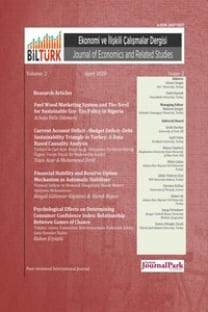Analyzing The Entrepreneurship Competencies Based on Demographic Features
Analyzing The Entrepreneurship Competencies Based on Demographic Features
The aim of this research is to examine how competencies of entrepreneurs differ according to their demographic characteristics. In the extent of this research, leadership, communication and persuasion, strategic resource development, self-efficacy, innovative creativity, resistance and durability, economic freedom motivation, risk propensity/taking, social networks development, responsibility and emotional intelligence, which are among the abilities that assume a definitive part in the accomplishment of entrepreneurs, were assessed. Meanwhile with the help of sub-competencies, the four main competencies, defined as entrepreneurship motivations, social competencies, managerial competencies and psychological competencies were analyzed. As a data gathering tool, EPAI (Entrepreneurial Potential Assessment Inventory) was applied to 118 entrepreneurs. Entrepreneurship competencies in four general and eleven sub-competencies were measured. After the scale application, it was analyzed how entrepreneurs’ competencies differ according to demographic features as educational levels, educational background, experience, ages, marital status and genders.
___
Alpkan, L., Keskin, H. and Zehir, C. (2006). Girişimcilik hisleriyle girişimcilik potansiyeli arasındaki ilişki: Gebze ve civarındaki girişimciler üzerine bir saha araştırması. Yüzyılda KOBİ’ler: Sorunlar, Fırsatlar ve Çözüm Önerileri Sempozyumu, Doğu Akdeniz Üniversitesi, Gazi Magosa, Kıbrıs.Antoncic, B. and Hisrich, R. D. (2003). Clarifying the intrapreneurship concept. Journal of Small Business and Enterprise Development, 10(1), 7-24.
Aydın, E. and Çakar, U. (2014). Ekogirişimcilik ve yaratıcılık ilişkisi: Geri dönüşüm sektörü üzerinde bir araştırma. Celal Bayar Üniversitesi İ.İ.B.F. Yönetim ve Ekonomi Dergisi. 21(1), 77-89
Aramand, M. (2012). Women entrepreneurship in Mongolia: The role of culture on entrepreneurial motivation equality, diversity and inclusion. An International Journal, Vol. 32 Issue: 1, pp.68-82,
Arıkan, S. (2004). Girişimcilik Temel Kavramlar ve Bazı Güncel Konular, İkinci Baskı, Ankara: Siyasal Kitabevi.
Bozgeyik, A. (2005). Girişimcilere yol haritası, İstanbul: Hayat Yayınları.
Bozkurt, Ö. (2006). Girişimcilik eğiliminde kişilik özelliklerinin önemi, Girişimcilik ve Kalkınma Dergisi, 1(2), 93-111
Cevher, E. (2016). Yenilikçi girişimciliğin geliştirilmesinde eğitimin önemi: Meslek yüksekokulu öğrencileri üzerine bir araştırma. Sosyal ve Beşeri Bilimler Araştırmaları Dergisi, 1-17. Çetinkaya Bozkurt, Ö. and Alparslan, A. M. (2013). Girişimcilerde bulunması gereken özellikler ile girişimcilik eğitimi: Girişimci ve öğrenci görüşleri. Girişimcilik ve Kalkınma Dergisi, 8(1), 7- 28
Darling, J. R., and Beebe, S. A. (2007). Effective entrepreneurial communication in organization development: Achieving excellence based on leadership strategies and values. Organization Development Journal, 25(1), 76.
Fayolle, A., Dubard B., S. and Kickul, J. (2008). Une Nouvelle Approche du Risque enCréation D'entreprise. Revue Française de Gestion, (5), 141-159.
Galindo, M. Á. and Méndez, M. T. (2014). Entrepreneurship, Economic Growth, AndInnovation: Are Feedback Effects At Work? Journal of Business Research, 67(5), 825829
Glancey, K. and McQuaid, R. (2000). Entrepreneurial economics. New York: St. Martin’s Press, Inc.
Gomez-Breysse, M. and Jaouen, A. (2012). L'entrepreneur au 21e siècle: Reflet des EvolutionsSociétales. Paris: Dunod.
Gupta, V. and MacMillan, I. C. (2004). Entrepreneurial leadership: Developing and measuring a cross-cultural construct. Journal of Business Venturing, 19(2):241– 260.
Huggins, R. (2000), The success and failure of policy-implanted inter-firm network initiatives: motivations, processes and structure. Entrepreneurship and Regional Development, Vol. 12 No. 2, pp. 211-36.
Janssen, F. (2009). Entreprendre: Une introduction à L'entrepreneuriat. Bruxelles: De Boeck.
Karagöz, Y. and Kösterelioğlu, İ. (2008). İletişim becerileri değerlendirme ölçüsünün faktör analizi ile geliştirilmesi. Dumlupınar Üniversitesi Sosyal Bilimler Dergisi, 21: 81-98
Kasouf, C. J. (2003). Opportunity assessment: A framework integrating positive psychology and environmental eariable. Working Paper. p1
Kristiansen, S. and Ryen, A. (2002). Enacting their business environment: Asian entrepreneurs in East Africa. African and Asian Studies, Vol. 1 No. 3, pp. 165-186.
Kristiansen, S. and Indarti, N. (2004). Entrepreneurial intention among Indonesian and Norwegian students. Journal of Enterprising Culture, Vol. 12 No. 1, pp. 55-78
Olsen, S. and Galamidi, B. (2009). Managing social and environmental impact: A new discipline for a new economy. Journal of World Affairs, 15(2), 43-56.
Orhan, K. (2017). Girişimcilik potansiyeli belirleme envanterinin (Entrepreneurial Potential Assessment Inventory-EPAI) Türkçe’ye uyarlanması ve psikometrik özellikleri. ODÜ Sosyal Bilimler Araştırmaları Dergisi (ODÜSOBİAD),7(3), 609-625.
Martin, R.L. and Osberg, S. (2007). Social entrepreneurship: The case for definition. Stanford Social Innovation Review, p. 30.
Santos, S., Caetano, A. and Curral, L. (2014). Psychosocial aspects of entrepreneurial potential. Journal of Small Business and Entrepreneurship, 26 (6), 661-685
Shane, S., Locke, E. and Collins, C.J. (2003). Entrepreneurial motivation. Human ResourcesManagement Review, 13 (2), 257-279.
Wennekers, S. and Thurik, R. (1999). Linking entrepreneurship and economic growth. Small Business Economics, Vol. 13, No. 1, 1999, p. 46-47.
Schmitt, C. (2008). Regards sur L'évolution des Pratiques Entrepreneuriales. Québec: Pressesde l'Université du Québec.
Souza, G. H., Santos, P. D., Lima, N. C., Cruz, N. J. and Lezana, A. G. (2016). Entrepreneurial potential and success in business: A Study on elements of convergence and explanation. RAM Revista de Administração Mackenzie, 17(5), 188-215
Soysal, A. (2010). Türkiye’de kadın girişimciler: Engeller ve fırsatlar bağlamında bir değerlendirme. Ankara Üniversitesi SBF Dergisi, 65 (01) , 83-114
Top, S. (2006). Girişimcilik keşif süresi, İstanbul, Beta Basım Yayım Dağıtım A.Ş
Tutar, H., Altınkaynak, F. and Terzi, D. (2017). Girişimcilik (temel girişimcilik ve iş kurma süreci ) (3.Baskı), Ankara: Detay Yayıncılık.,
Ulucan, S. (2015). Girişimcilik eğiliminin ve girişimcilik eğilimini etkileyen faktörlerin analizi: Ortaöğrenimde lise 3. ve 4. sınıf öğrencileri üzerinde bir uygulama. Gazi Üniversitesi Sosyal Bilimler Enstitüsü, İşletme Ana Bilim Dalı Yönetim Organizasyon Bilim Dalı, Yüksek Lisans Tezi, Haziran 2015, Ankara.
Yelkikalan, N. (2006). 21.yüzyılda girişimcinin yeni özelliği: duygusal zeka. Girişimcilik ve Kalkınma Dergisi, 1(2), 39-51.
- Yayın Aralığı: Yılda 4 Sayı
- Başlangıç: 2019
- Yayıncı: Fatih DEYNELİ
